Diplomatic Bluebook 2022
Chapter 3
Japan Strengthening Its Presence in the International Community
2 Cultural, Sports, and Tourism Diplomacy
(1) Overview
For a very large number of foreign nationals who have an interest in Japan, Japanese culture is a motive for their interests. MOFA and the JF carry out various projects ranging from introducing Japanese culture and sports to promoting inbound tourism, aimed at creating positive images of Japan abroad, boosting the overall Japanese brand, and encouraging a deeper understanding of Japan, as well as fostering the circle of people with a great affinity toward or knowledge of Japan and increasing the number of foreign visitors to Japan in the post-COVID-19 world. For example, “Cultural Projects of Diplomatic Missions Overseas” introduce the wide-ranging attractions of Japan, from traditional culture such as tea ceremony, flower arrangement and martial arts, to aspects of modern culture such as anime, manga and fashion and Japanese food culture. As it continued to be difficult to implement programs with guests and participants in 2021 due to the COVID-19 pandemic, the diplomatic missions overseas also used online media to organize and conduct many programs.
Under the “Japan Brand Program,” MOFA has dispatched experts of various fields overseas to establish a national brand and give Japan a stronger presence in the world. MOFA also holds seminars, workshops and demonstrations to share Japan's outstanding cultural assets, which represent a culmination of Japan's experience and wisdom. In light of the continued difficulty in sending experts overseas due to the spread of COVID-19, MOFA continued to share Japan's charm by incorporating projects using online platforms. By harnessing tools such as online platforms and video-streaming, MOFA will continue to put effort into sharing Japan's diverse charm and strengths.
Taking the opportunity of the Tokyo 2020 Games held in 2021 to further enhance Japan's presence in the field of sports, MOFA engaged in initiatives as part of the “Sport for Tomorrow (SFT)” program, such as various sports exchanges and sports promotion support projects overseas, dispatching sports instructors through the JICA Japan Overseas Cooperation Volunteers (JOCV) program, and the provision of sporting equipment and improvement of sporting facilities through Cultural Grant Assistance. In addition, MOFA provided information about these initiatives in Japan and abroad on MOFA's “MofaJapan × SPORTS” Twitter account. MOFA also supports the Host Town Initiative that promotes mutual exchange with the countries and regions participating in the Tokyo 2020 Games.
MOFA conducts a range of activities through Japan's diplomatic missions overseas to promote a deeper understanding of Japan by fostering the circle of the next generation of people with a great affinity toward or knowledge of Japan and encouraging Japanese studies. These include providing information on studying in Japan; building alumni networks comprising foreign nationals who have studied in Japan; cooperating with the JET Program, which invites young foreign nationals to work for local governments in Japan; holding exchange programs for youth and adults from Asia and the U.S.; and providing support for Japanese studies.
Promoting Japanese language overseas fosters individuals who engage in exchange with Japan, deepens understanding of Japan, and creates foundations for friendship between Japan and other countries. Japanese language education is becoming increasingly important, as evidenced by the promulgation and entering into force of the Act on Promotion of Japanese Language Education in June 2019, and the formulation of the Basic Policy for the Comprehensive and Effective Implementation of Measures to Promote Japanese Language Education (Cabinet Decision) in June 2020. Through the JF, MOFA dispatches Japanese language specialists overseas, conducts training programs for overseas Japanese language teachers, and develops Japanese language education materials. To address the labor force shortage in Japan, Japan began accepting foreign workers under the “Specified Skilled Worker” residence status since April 2019. In this connection, MOFA has also been working to meet a new type of need by providing Japanese language education to foreigners interested in coming to Japan for work.
In cooperation with the United Nations Educational, Scientific and Cultural Organization (UNESCO), Japan has been actively engaged in preserving the world's tangible and intangible cultural heritage. Moreover, Japan is actively taking part in the international framework of safeguarding heritage through conventions such as the World Heritage Convention and the Convention for the Safeguarding of the Intangible Cultural Heritage (see (7) on page 325).
By putting creative efforts into promoting such cultural and sports diplomacy during the COVID-19 pandemic, such as through online channels, and by sharing information on Japan's charms to the world, MOFA also contributes to bringing more foreign visitors to Japan in the future.
(2) Cultural Programs
For Japan's foreign policy to be smoothly implemented in the international community, it is important to promote a better understanding of Japan among the individual foreign nationals who form the foundation of public opinion and policy making, and to make Japan's image even more positive. Based on this perception, MOFA engages in communicating information about the diverse attractions of Japan through diplomatic missions overseas and the JF. Diplomatic missions overseas carry out a range of cultural projects as part of efforts to promote a deeper understanding of Japan and expand the circle of people with a great affinity toward Japan in the areas under their jurisdiction. For example, they actively introduce Japanese lifestyles and culture such as workshops on tea ceremony, flower arrangement and origami, Japanese film screenings, Japanese music performances, martial arts demonstrations, exhibitions on traditional crafts and Japanese photography, popular culture such as anime and manga, as well as Japan's food culture. At the same time, they also plan and implement Japanese speech contests and essay contests.
In 2021, during the Olympic and Paralympic Month held in El Salvador from July to September, photograph exhibitions were held to introduce information regarding past Games with a focus on the Tokyo 2020 Games and the participating athletes and competitions. In addition, as part of the efforts to promote exchanges with the host town (Fujisawa City), a drawing contest and exhibition were held, based on the motif of the mascot characters. Furthermore, the videos and information regarding the Tokyo 2020 Games were shared on the Embassy's Facebook page, and cultural seminars were held by local Japanese cultural groups. The total reach of the posts during the event period exceeded 680,000.
In collaboration with MOFA and diplomatic missions overseas, the JF promotes and provides support for Japanese-language education and Japanese studies, as well as runs arts and cultural exchange projects to promote Japanese culture and arts in a variety of forms throughout the world. With regard to arts and cultural exchange projects, in light of the COVID-19 pandemic, cultural introduction and dialogues were conducted online by the JF headquarters and overseas offices such as “STAGE BEYOND BORDERS,” which presents the videos of Japanese performing arts in multiple languages.
Under the “WA Project: Toward Interactive Asia through Fusion and Harmony” announced by Prime Minister Abe in December 2013, the Japan Foundation Asia Center has continued to implement and coordinate projects while taking into consideration the COVID-19 situation. In 2021, 75 people were dispatched to Thailand and Indonesia to participate in exchange programs that are facilitated through support for Japanese language education and introduction to Japanese culture. With regard to cultural and arts exchange projects, due to the spread of COVID-19, assistance was provided for exchange projects held through online channels that do not involve the physical movement of people, and exchanges between Japanese and Asian filmmakers were conducted in a hybrid format through the “Conversation Series at Asia Lounge” project, organized in collaboration with the Tokyo International Film Festival.
The Japan International MANGA Award was launched by MOFA in 2007 with the aim of rewarding manga creators who have contributed to the spread of manga culture overseas and the promotion of international cultural exchanges through manga. The 15th Japan International MANGA Award, held in 2021, received a record-high 483 entries from 76 countries and regions, and the Gold Award was presented to a work from the Netherlands. This year, there were entries for the first time from Armenia, North Macedonia, Bahrain, Fiji, Botswana, Moldova, and Lebanon.
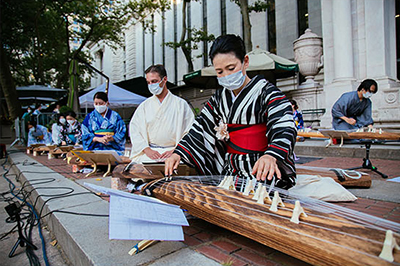 Japanese instruments performance on Music Day (June 21, New York, U.S.)
Japanese instruments performance on Music Day (June 21, New York, U.S.)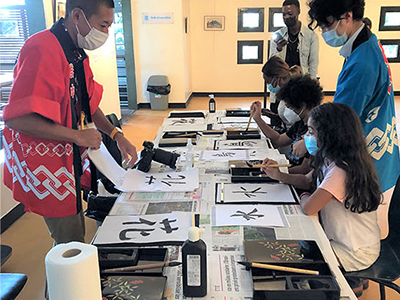 Japan Week (October 6-23, Libreville, Gabon)
Japan Week (October 6-23, Libreville, Gabon)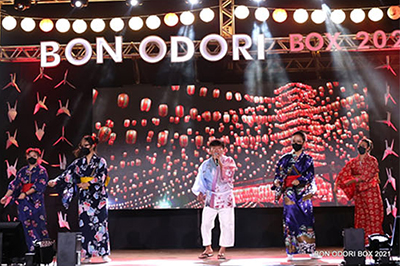 Goiás Bon-odori Festival (August 28, Goiás, Brazil)
Goiás Bon-odori Festival (August 28, Goiás, Brazil)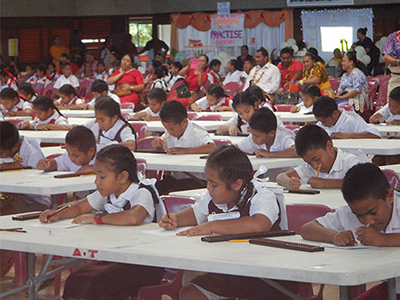 National Soroban Competition (November 16, Tongatapu, Tonga)
National Soroban Competition (November 16, Tongatapu, Tonga)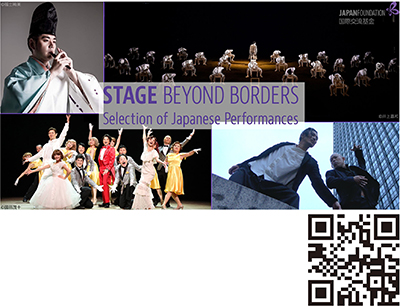 “STAGE BEYOND BORDERS,” video series of performing arts works presented by the Japan Foundation (Available online; Photo: The Japan Foundation)
“STAGE BEYOND BORDERS,” video series of performing arts works presented by the Japan Foundation (Available online; Photo: The Japan Foundation)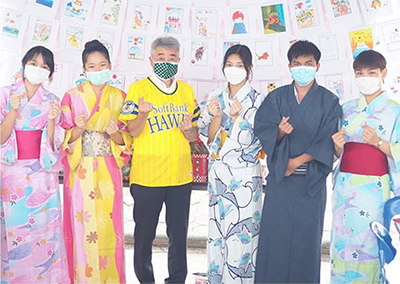 Projects introducing Japanese culture (December, Thailand;
Projects introducing Japanese culture (December, Thailand;Photo: The Japan Foundation)
(3) People-to-People Exchange and Exchanges in the Area of Education and Sports
To build personal relationships and promote a better understanding of Japan, MOFA carries out a number of programs that invite foreign nationals who have a significant influence on shaping public opinion and the policymaking process and who are expected to play a leading role in various fields. In the area of education and sports, MOFA conducts various activities to promote people-to-people exchanges. These programs not only promote mutual understanding and friendships but also enhance Japan's presence in the international community, which considerably benefits Japan's national diplomatic interests.
A Student Exchange Programs
MOFA actively introduces the attractiveness and opportunities of studying in Japan to foreign students through Japanese diplomatic missions overseas, and implements application and screening procedures to grant the Japanese Government (MEXT) Scholarship to promising students abroad. It also makes efforts to network with former foreign students who have returned to their home countries through Japan Alumni Associations and to foster the circle of people with a great affinity toward or knowledge of Japan. In March 2021, the first Japan Alumni Conference was held online, attended by 60 people from 43 countries. At the Conference, alumni from various countries shared best practices and strengthened their networks through the social gathering.
B JET Programme (The Japan Exchange and Teaching Programme)
The JET Programme was launched in 1987 to improve foreign language education in Japan and promote international exchange with Japanese citizens in local areas. To date, about 70,000 people have taken part in the program and were dispatched all over Japan. This program is administered by local authorities and other organizations in cooperation with the Ministry of Internal Affairs and Communications (MIC), MOFA, the Ministry of Education, Culture, Sports, Science and Technology (MEXT), and the Council of Local Authorities for International Relations (CLAIR). Through the program, young foreign nationals are invited to Japan and appointed to posts in local governments and schools. MOFA is responsible for the application and screening process, pre-departure orientation, and support for the activities of the JET Alumni Association (JETAA), which operates in 18 countries and has about 25,000 members. JETAA conducts activities to introduce Japan in many countries. Many of those who went through the JET Programme are important human and diplomatic assets for Japan, as they go on to work in a variety of fields around the world as supporters for Japan and experts of Japan. In spite of the impact of the global COVID-19 pandemic in 2021, some of the accepted participants were able to come to Japan after taking the necessary measures.
C Sports Exchange
Sports enable communication beyond language and can be an effective tool for promoting friendly relations and a better understanding of Japan. Amidst the growing interest in Japan in the world prior to the Tokyo 2020 Games, the Government of Japan implemented the “Sport for Tomorrow (SFT)” program. Under the “Projects for Sports Diplomacy Enhancement” scheme that has been ongoing since FY2015, MOFA implemented sports exchange projects such as dispatching and inviting athletes and instructors, supporting equipment transportation as well as holding sports-related receptions at diplomatic missions overseas, thereby contributing to the development of bilateral relations. As the cross-border movement of people was restricted in 2021 due to the impact of the COVID-19 pandemic, the focus was placed on exchanges through equipment transportation and support. These projects enhance mutual understanding internationally and contribute to international peace by promoting diplomacy through sports and by nurturing people with a great affinity toward or knowledge of Japan. At the same time, these programs also improved the standing of Japanese sportspeople in the international arena.
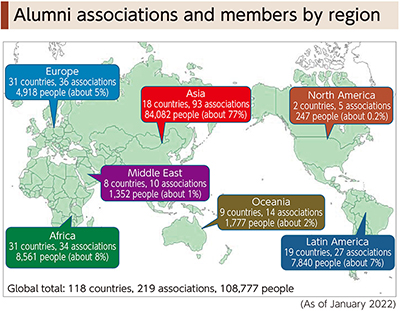
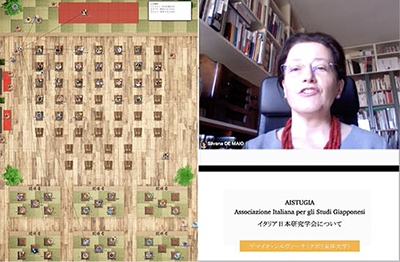 Activity report at the Japan Alumni Conference (Online)
Activity report at the Japan Alumni Conference (Online)
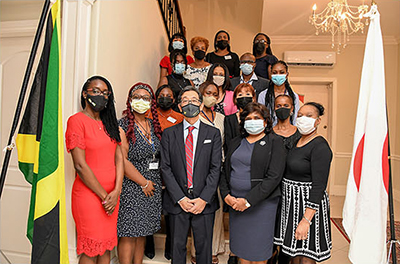 Farewell reception for JET participants before they depart for Japan (November, Kingston, Jamaica; Photo: Jamaica Observer)
Farewell reception for JET participants before they depart for Japan (November, Kingston, Jamaica; Photo: Jamaica Observer)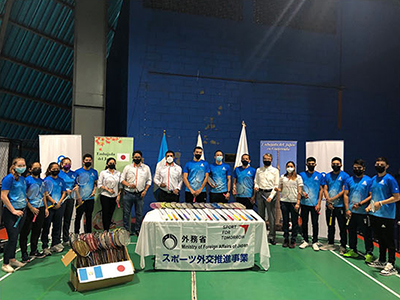 Donation ceremony for badminton rackets, provided through equipment transportation and support (October, Guatemala)
Donation ceremony for badminton rackets, provided through equipment transportation and support (October, Guatemala)D Japan's Friendship Ties Programs
With a view to developing bilateral and inter-regional relationships between Japan and countries and regions in the Asia-Pacific, North America, Europe, Latin America and the Caribbean, as well as expanding the basis for Japan's diplomacy, Japan's Friendship Ties Programs provide opportunities for people-to-people exchanges to youths from various countries and regions, through invitations, dispatches, and online exchanges. In addition to promoting understanding of Japan in fields such as politics, economy, society, culture, history, and foreign policy, these projects also work to find and nurture people who will have great affinity toward or knowledge of Japan in the future. With the continued impact of the COVID-19 pandemic in 2021, online exchange programs were promoted. Youths from the abovementioned regions participated in webinars on specialized subjects, exchanged opinions, and visited the relevant facilities. They also made virtual visits to host towns of the Tokyo 2020 Games and disaster-stricken areas, and experienced Japanese culture including homestays, to build networks with Japanese people. Furthermore, the sharing of experiences by youths from various countries and regions, such as what they have learnt through the programs and the places they have visited, on social media and other channels, also contributes to promoting understanding of Japan in the international society and to enhancing Japan's image.
(4) Exchange in the Intellectual Field
A Japanese Studies
The JF comprehensively supports a range of overseas research activities related to the politics, economy, society and culture of Japan. With regard to JF's Japanese Studies Fellowship Programme, due to the COVID-19 pandemic in 2020, projects that involve the global movement of people around the world had to be postponed. Nevertheless, starting from October 2021, visits to Japan by overseas Japanese researchers are resuming gradually while ensuring compliance with border measures.
The JF also expanded the collection of books on Japan, dispensed research grants, and provided support for organizing seminars and symposiums, including online events, to a total of 41 institutions of Japanese studies in 21 countries and regions. In addition, it provides support to academic societies with the goal of promoting network building among Japanese studies researchers and research institutions from various countries and regions.
B Intellectual Exchanges
MOFA also conducts intellectual exchange programs through the JF. Specifically, it provides support and co-hosts seminars and symposiums on common international issues, and provides assistance on programs such as lectures to deepen understanding of modern Japan in major universities overseas. It also planned and provided support for exchange programs to strengthen relations and deepen mutual understanding through dialogues in various fields at various levels, such as by implementing the Japan Outreach Initiative (JOI) Program, which dispatches grassroots exchange coordinators between Japan and the U.S. with the aim of deepening interest and understanding of Japan at the grassroots level in the U.S.
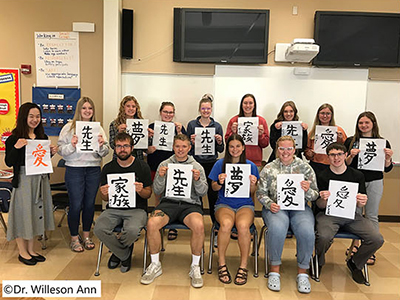 Japan Outreach Initiative (JOI) Program dispatching grassroots coordinators between Japan and the U.S. (September 28, Mayville State University, U.S.; Photo: Japan Foundation)
Japan Outreach Initiative (JOI) Program dispatching grassroots coordinators between Japan and the U.S. (September 28, Mayville State University, U.S.; Photo: Japan Foundation)C Japan-United States Conference on Cultural and Educational Interchange (CULCON)
CULCON is a panel where experts from the public and private sectors in Japan and the U.S. engage in discussions on culture, educational exchanges, and intellectual dialogues. In April, a final report about the trends in international students between Japan and the U.S., compiled by the Education Exchange Review Committee of CULCON, was submitted to Prime Minister Suga by the Chair of CULCON, Kato Ryozo. In October, the 29th Plenary Meeting of the CULCON was held in a hybrid format, and a joint statement was issued. This joint statement, submitted by Chair Kato to Prime Minister Kishida in November, affirmed that people-to-people exchanges constitute an important pillar of Japan-U.S. partnership.
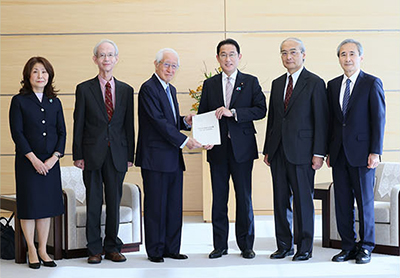 Japan-United States Conference on Cultural and Educational Interchange (CULCON) (November 19, Prime Minister's Office;
Japan-United States Conference on Cultural and Educational Interchange (CULCON) (November 19, Prime Minister's Office;Photo: Cabinet Public Relations Office)
D Cooperation with the United Nations University (UNU)
The UNU is the only UN organization based in Japan, and it contributes to the international community through study and research on global issues and human resource development. Japan has been providing various forms of cooperation and support to the organization. In October, Dr. Shirahase Sawako was appointed as the Senior Vice-Rector and Assistant Secretary-General of the United Nations, succeeding Prof. Oki Taikan. Through collaboration with Japanese universities and research institutions, the UNU engages in studies on international issues of importance to Japan, including peace, development and the environment, and consequently helps to convey information on the policies of the Government of Japan. Since 2017, the SDG Corporate Strategy Forum has been conducted as an initiative to help the promotion of SDGs take root among corporations. Of the approximately 20 Japanese corporations participating in this Forum, six rank among the top 20 companies that have been highly rated for their SDGs initiatives, demonstrating the great importance and contributions of this Forum. The UNU has also established Master's and Doctoral programs in its graduate school, and is making efforts to improve the quality of its global human resource development programs.
(5) Promotion of the Japanese Language
As the globalization of Japan's economy prompts more Japanese companies to do business overseas and Japanese pop culture finds increasing global popularity, interest in learning Japanese is growing around the world, especially among young people. A better understanding of the Japanese language overseas naturally leads to a more favorable international environment for Japanese people and companies. A survey conducted by the JF in FY2018 found that approximately 3.85 million people in 142 countries and regions overseas learn Japanese. In 2019, the number of applicants for the Japanese Language Proficiency Test offered by the JF (including those taking the test in Japan) reached a record high of about 1.37 million. The test has been conducted partially since 2020 due to the COVID-19 pandemic, and the number of applicants in 2021 remained at approximately 810,000 people. However, it is clear that a shortage of Japanese language teachers is a major challenge in the pursuit of satisfying the increasingly diverse interests in and needs concerning Japanese language learning in these many countries and regions.
Through the JF, MOFA works to address the diverse needs related to Japanese language education overseas. For example, MOFA dispatches Japanese language specialists abroad, carries out training programs for Japanese language teachers, foreign diplomats and civil servants overseas, conducts preparatory Japanese language pre-arrival training for nurse and care worker candidates based on the Economic Partnership Agreement (EPA) with Indonesia and the Philippines, encourages educational institutions in each country and region to introduce Japanese language education and supports Japanese language educational activities, develops teaching materials, runs e-learning programs, and promotes the “JF Standard for Japanese-Language Education,” which corresponds with international standards for foreign language education.
To address labor force shortages in Japan brought about by aging and depopulation, Japan began accepting foreign workers under the new “Specified Skilled Worker” residence status since April 2019. Accordingly, MOFA is taking new measures that include conducting the Japan Foundation Test for Basic Japanese (JFT-Basic), which assesses the Japanese language ability of foreign nationals who come to Japan based on the “Comprehensive Measures for Acceptance and Coexistence of Foreign Nationals” (decided upon at the December 25, 2018, Ministerial Conference on Acceptance and Coexistence of Foreign Nationals) (by 2021, a total of 47,012 people have taken the test in seven countries overseas and within Japan), as well as developing and disseminating learning materials and curriculum with the goal of fostering people's Japanese language ability effectively, and nurturing local Japanese language teachers who teach Japanese to those who wish to work in Japan.
(6) Cultural Grant Assistance
To promote culture, sports, and higher education in developing countries, as well as provide support for the improvement of facilities and the purchase of equipment to be used in the conservation of cultural heritage, thereby enhancing mutual understanding and friendly relations between Japan and these countries, the Government of Japan provides Cultural Grant Assistance as part of the Official Development Assistance (ODA). The assistance implemented in 2021 consisted of two Cultural Grant Assistance projects (totaling around 219.6 million Japanese yen) and 12 Grant Assistance for Cultural Grassroots Projects (totaling around 97.3 million Japanese yen). In 2021, Cultural Grant Assistance was implemented with an emphasis on the provision of equipment for the production of TV programs and the provision of exhibition equipment for natural and cultural heritage protection facilities, while Grant Assistance for Cultural Grassroots Projects centered on cooperation in promoting sports and Japanese language studies.
(7) Cooperation through United Nations Educational, Scientific and Cultural Organization (UNESCO)
UNESCO is the first international organization that Japan became a member state of after the war, in 1951. Japan is actively involved in a variety of UNESCO projects in the fields of education, science and culture. Since 1952, Japan has continued to serve as a member of the Executive Board of UNESCO, and it was reelected in the election of Executive Board members held in November 2021. Japan also cooperates with UNESCO to provide support to developing countries in areas such as education, science, and culture.
In the field of culture, Japan cooperates actively toward the preservation and promotion of the world's tangible and intangible cultural heritage, while providing support in the field of human resource development. Representative efforts in this area include the provision of continuous support for the safeguarding and development of the Historic Site of Angkor in Cambodia since 1994, and the implementation of a series of projects in Afghanistan to preserve and restore the Bamiyan ruins since 2003. In these projects, Japanese experts play a leading role, while human resource development is undertaken to enable local people to protect such sites by themselves in the future. At the same time, Japan has also provided support for the formulation of conservation and management plans for heritage sites, and support toward preservation and restoration. In recent years, Japan has also been providing support for human resource development to African countries and small island developing states to help them strike a balance between protecting cultural heritage and sustainable development. As for the safeguarding of intangible cultural heritage, support is provided to projects to pass on traditional performing arts such as music, dance, and traditional arts and crafts to the next generation in developing countries, as well as projects involving developing domestic institutions and capacity building for relevant parties to enhance countries' ability to protect intangible cultural heritage by themselves.
Filmmaker Kawase Naomi is the first Japanese woman to be designated as a UNESCO Goodwill Ambassador. In November 2021, the appointment ceremony was held at the UNESCO Headquarters. Ms. Kawase is expected to apply her previous experience in international cultural exchange through films to further the development of cultural and creative industries, and to engage in activities toward the realization of gender equality in the field.
In the field of social and human sciences, UNESCO's Recommendation on the Ethics of Artificial Intelligence, for which Japan participated in discussions, was adopted in November at the 41st session of the General Conference of UNESCO.
Director-General Audrey Azoulay, who was re-elected at the same session, has worked on promoting “strategic transformation” including reforms toward de-politicization and organizational reforms, and Japan has consistently supported her in her efforts. Going forward, Japan will continue to contribute actively to UNESCO activities that are advanced under her leadership.
A World Heritage Convention
The World Heritage Convention aims to protect cultural heritage and natural heritage internationally as heritage belonging to all mankind. Japan became a party to the Convention in 1992 (194 parties are in the Convention as of December 2021). The sites listed on the “World Heritage List” are known as “World Heritage Sites.” They are classified into “Cultural Heritage Sites” (monuments and remains), “Natural Heritage Sites” (natural areas) and “Mixed Heritage Sites” (sites with both cultural and natural elements). As of December 2021, a total of 1,154 World Heritage Sites are inscribed on the World Heritage List.
At the Extended 44th session of the World Heritage Committee held in July, it was decided that the Jomon Prehistoric Sites in Northern Japan would be newly inscribed as a cultural heritage, while Amami-Oshima Island, Tokunoshima Island, Northern part of Okinawa Island, and Iriomote Island would be newly inscribed as a natural heritage. This takes the number of world heritage sites in Japan to 25, comprising 20 cultural heritage sites and 5 natural heritage sites. At the 23rd session of the General Assembly of States Parties to the Convention Concerning the Protection of the World Cultural and Natural Heritage held in November, Japan was elected to and assumed its position on the World Heritage Committee. At a meeting of the World Cultural Heritage Subcommittee of the Council for Cultural Affairs convened in December, Sado Island Gold Mines (the Sado complex of heritage mines, primarily gold mines) was selected as a candidate considered to be suitable for recommendation as a World Cultural Heritage site for FY2021. On February 1, 2022, with the acknowledgement of the Cabinet, a recommendation for the inscription of Sado Island Gold Mines was submitted to UNESCO.
B Convention for the Safeguarding of the Intangible Cultural Heritage
The Convention for the Safeguarding of the Intangible Cultural Heritage aims to develop an international system for safeguarding intangible cultural heritage such as traditional performing arts and traditional craftsmanship techniques (as of December 2021, the number of parties to the convention is 180). Japan, with abundant experience in safeguarding domestic intangible cultural properties, served as the chair of the intergovernmental working group reviewing the operational mechanism of this Convention, and led discussions by incorporating requests from developing countries. Currently, a total of 22 elements from Japan have been inscribed on the Representative List of the Intangible Cultural Heritage of Humanity formulated based on this Convention. In March, a proposal for the inscription of “Furyu-odori” in 2022 was submitted to UNESCO.
C UNESCO Memory of the World Programme
The UNESCO Memory of the World Programme was established in 1992 to promote the safeguarding of and access to, and raise awareness of valuable archival heritage. As of December 2021, 429 items have been inscribed under the international register.
The fact that member states could not be involved in the assessment process of the nominations under the previous mechanism, despite the possibility of there being clear discrepancies between the views of the concerned member states over a nominated documentary heritage, is not consistent with the founding principle of UNESCO: promoting friendly ties and mutual understanding among member states. Since 2017, a comprehensive review process has been undertaken while freezing new nominations. As a result, a new mechanism was approved by the UNESCO Executive Board in April, under which nominations are submitted through the governments of member states. Additionally, a contestation system was newly established, which keeps on hold nominations over which member states have conflicting views until dialogues between the concerned countries have been concluded. With the completion of the review process, the call for new nominations resumed in July. In November, Japan submitted two nominations to UNESCO: Three Comprehensive Printed Editions of the Buddhist Canon Held in Zojoji of the Jodo Shu, nominated by Religious Corporation Jodo Shu and Jodo Shu Principal Temple Zojoji, and the Monk Enchin Archives: A History of Japan-China Cultural Exchange, nominated by Onjo-ji Temple and Tokyo National Museum.
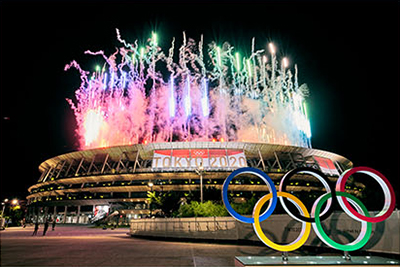 Opening ceremony of the Olympic Games Tokyo 2020 (July 23, Tokyo. Photo: Tokyo Organizing Committee of the Olympic and Paralympic Games)
Opening ceremony of the Olympic Games Tokyo 2020 (July 23, Tokyo. Photo: Tokyo Organizing Committee of the Olympic and Paralympic Games)The Olympic Games Tokyo 2020 were held from July 23 to August 8, 2021, and the Paralympic Games Tokyo 2020 were held from August 24 to September 5, 2021. Due to the rapid spread of COVID-19 around the world in the spring of 2020, Prime Minister Abe and President Thomas Bach of the International Olympic Committee (IOC) agreed to postpone the Games in a telephone call on March 24, 2020. Thereafter, the IOC Executive Board made the official decision to postpone the Games. The COVID-19 pandemic did not come to an end after that, and even until just before the opening of the Olympic and Paralympic Games Tokyo 2020 (the Tokyo 2020 Games), various opinions were put forth both in Japan and overseas concerning the holding of the Tokyo 2020 Games. However, those involved in the Tokyo 2020 Games felt a strong desire to convey Japan's message to the world: it is precisely at a time when the world is confronted by the immense challenge of the COVID-19 pandemic that it should stand united and overcome the difficult situation through the efforts and wisdom of humankind. With this in mind, the Tokyo 2020 Games were held as the first large-scale international sporting event to take place during the COVID-19 pandemic. During the Games, the world showed enthusiasm and fervor toward the activities by athletes from around the world, and many gave positive feedback about Japan's outstanding management of the Tokyo 2020 Games through the cooperation of the Japanese people, including the volunteers. During the duration of the Games, a total of 18 government leaders and other important personnel from 14 countries and two international organizations visited Japan regardless of the COVID-19 pandemic. They held talks with Prime Minister Suga and other key personnel from the Japan side. As such, the Tokyo 2020 Games also served as a stage for diplomatic exchanges.
■Main feedback from the international community about the Tokyo 2020 Games
1. Justin Trudeau, Prime Minister of Canada
“I extend my thanks to the people of Japan for hosting a successful Olympic Games, in spite of the unprecedented hurdles presented by the global COVID-19 pandemic.” (August 9, statement on the closing of the Tokyo 2020 Games)
2. Caroline Kennedy, former Ambassador of the United States to Japan
“Japan was the most suitable place to hold the Olympics in, and I am very happy that they did so well... they have done a great job.” (August 2, interview on “TODAY” on the NBC Network)
3. Julia Longbottom, British Ambassador to Japan
“The Games are a most wonderful opportunity to showcase the human spirit and the ability of human beings to really excel in physical competition. [...] Japan has given the world, the people of the world, hope and optimism.” (Source: “Initiatives and Legacies ~ TOKYO 2020” produced by the Headquarters for the Promotion of the Tokyo Olympic and Paralympic Games)
4. British newspaper, The Guardian
“[...] it is a mark of Tokyo's grace as a host that the experience for its guests has been marked by gentleness. [...] care and kindness will remain, a lesson in how to exist in such close proximity in these grueling times.” (August 6, The Guardian online)
5. The Associated Press
“The Paralympics may leave a more tangible legacy in Japan than the Olympics, raising public awareness about people with disabilities and the provision of accessible public space.” (September 5, AP News online)
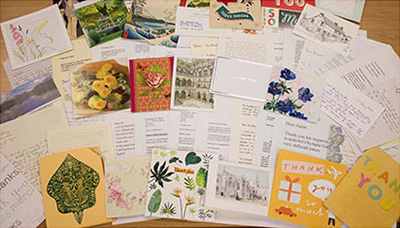 Letter of appreciation for the Games sent from a British citizen to the Embassy of Japan in the UK
Letter of appreciation for the Games sent from a British citizen to the Embassy of Japan in the UKThe comments featured here are only some of the positive comments received. In addition, letters of appreciation for hosting the Games were also sent from leaders of various countries to the Prime Minister of Japan, and many messages were received from the citizens of various countries to Japanese diplomatic missions overseas to express their gratitude to Japan. Hence, the Tokyo 2020 Games became an event that symbolized the unity of people around the world in the face of an immense challenge to humankind.
The southern islands, home to many unique plant and animal species.
The northern Jomon prehistoric sites, blessed with the bounty of nature.
These two regions, despite being far from each other in time and space, both gained global attention at the same time. That attention came from new inscription on the World Heritage List in July 2021. For Japan, it had been ten years since two properties were inscribed in one year.
After becoming a party to the World Heritage Convention in 1992, Japan has put significant effort together with other countries, organizations, and local residents in Japan to collaboratively preserving the cultural and natural heritage of countries around the world, including Japan, as the common heritage of all humankind.
This column introduces these two precious properties, whose inscription on the World Heritage List was the fruit of many years of effort by Japan.
The first property is the natural heritage of Amami-Oshima Island, Tokunoshima Island, Northern part of Okinawa Island, and Iriomote Island. These four islands separated from the Eurasian Continent between approximately 12 million to 2 million years ago, with terrestrial species unable to cross the ocean following a unique evolutionary path. Such isolation has meant that the islands feature many endemic species, such as the Amami Rabbit, the Iriomote Cat, and the flightless Okinawa Rail, which cannot be seen anywhere else in the world. The diversity of endemic species and endangered species that live on these four islands make them irreplaceable sites for the protection of global biodiversity, a value which was recognized by the inscription.
The second property is the cultural heritage of Jomon Prehistoric Sites in Northern Japan. This property consists of 17 archaeological sites spread across Hokkaido, Aomori Prefecture, Iwate Prefecture, and Akita Prefecture. During the era from approximately 13,000 BCE to 400 BCE, known as the Jomon Period, this region was inhabited by people who created a sedentary hunter-fisher-gatherer society. Through ceremonies and rituals that probably revered their ancestors and nature as well as offered prayers for plentiful harvests, they developed a complex spiritual culture. Maintaining a sedentary society for over 10,000 years without transitioning to agriculture is globally unusual, and the prehistoric sites which remain today have been assessed as precious evidence of it.
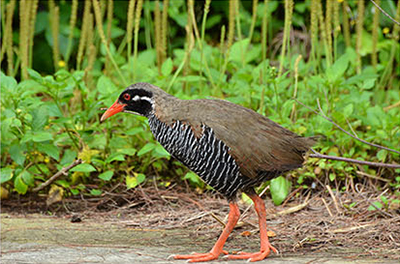 Okinawa Rail (Photo: Ministry of the Environment)
Okinawa Rail (Photo: Ministry of the Environment)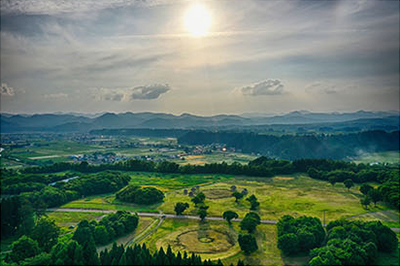 Oyu Stone Circles (Kazuno City, Akita Prefecture. Photo: the JOMON ARCHIVES)
Oyu Stone Circles (Kazuno City, Akita Prefecture. Photo: the JOMON ARCHIVES)With Hokkaido in the north and Okinawa in the south, these two properties are located at each end of the long Japanese archipelago, forming a wonderful opportunity to showcase to the world how diverse and rich Japan's nature and culture is.
The challenges to inscription on the World Heritage List are by no means easy. We would like to take this opportunity to again thank all the stakeholders involved, including local residents and local governments, for their united efforts to overcome the challenges for inscription.
But we must also remember that inscription on the World Heritage List is not a goal in itself. Rather, it means that an even more rigorous approach to preservation and management is demanded. The World Heritage Committee holds that World Heritage properties must have “Outstanding Universal Value” and should also “be preserved by all the people of the world.” The understanding and cooperation of every person in Japan is essential to passing on this legacy to the next generation.
We hope that the new World Heritage properties inscribed in 2021 will be loved by many and passed on to the future generation.


